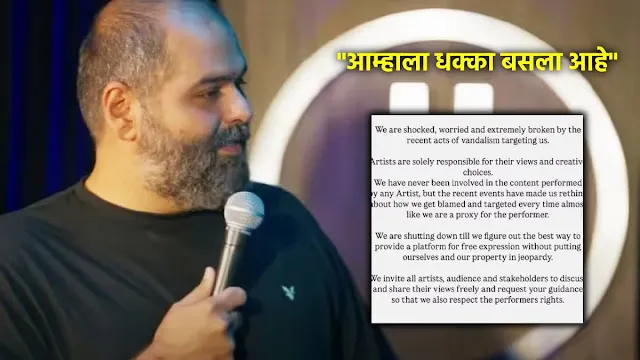In the vibrant tapestry of India's stand-up comedy scene, few figures are as polarizing as Kunal Kamra. Known for his incisive political satire and unflinching critiques of the establishment, Kamra has often found himself at the intersection of humor and controversy. His recent performance at Mumbai's Habitat Studio, however, has escalated this dynamic to unprecedented levels, sparking debates on freedom of expression, political sensitivity, and the boundaries of comedic license.
The Performance That Sparked Outrage
During his show titled "Naya Bharat," Kamra delivered a routine that included a parody of the popular Bollywood song "Bholi Si Surat." In this rendition, he referred to Maharashtra Deputy Chief Minister Eknath Shinde as a "gaddar" (traitor) and "rickshawallah," alluding to Shinde's past as an auto-rickshaw driver and his political realignment from the Shiv Sena faction led by Uddhav Thackeray to the one aligned with the Bharatiya Janata Party (BJP). The parody quickly gained traction on social media, drawing sharp reactions from Shinde's supporters and members of his Shiv Sena faction.
Political Repercussions and Legal Actions
The backlash was swift and multifaceted. Shiv Sena MLA Murji Patel filed a complaint against Kamra at the MIDC police station, leading to the registration of a First Information Report (FIR) under various sections of the Bharatiya Nyaya Sanhita (BNS), 2023, including those pertaining to statements conducing to public mischief and defamation. Patel demanded a public apology from Kamra within two days, warning of further actions if the comedian failed to comply. He also indicated plans to raise the issue in the legislative assembly and urged the state home minister to take stringent measures against Kamra.
Adding to the chorus of condemnation, Shiv Sena MP Naresh Mhaske accused Kamra of being a "hired comedian" making derogatory remarks for monetary gain. Mhaske's statements intensified the political discourse surrounding the incident, highlighting the deep divisions and sensitivities within Maharashtra's political landscape.
Vandalism at Habitat Studio
The controversy took a violent turn when members of the Shiv Sena's youth wing, led by General Secretary Rahool Kanal, allegedly vandalized the Habitat Studio in Mumbai's Khar area. The group reportedly disrupted an ongoing performance by comedian Rajat Sood, forced the show to end prematurely, and caused significant damage to the studio's property. In response, the Mumbai police registered an FIR against Kanal and 19 others, citing charges related to unlawful assembly, trespassing, and damaging private property.
Habitat Studio's Temporary Closure
In the aftermath of the vandalism, Habitat Studio announced a temporary shutdown, expressing deep concern over the recent events. In a statement, the studio emphasized that while artists are solely responsible for their content, the venue has been unfairly targeted as a proxy for performers. The management underscored their commitment to providing a platform for free expression but highlighted the need to reassess how to do so without jeopardizing their safety and property.
Government's Stance and Public Discourse
Maharashtra Chief Minister Devendra Fadnavis weighed in on the controversy, asserting that while freedom of speech is respected, recklessness will not be tolerated. He called for Kamra to issue an apology for his remarks, reflecting the government's stance on maintaining decorum in public discourse.
The incident has ignited a broader debate on social media and among the public regarding the limits of satire and the sanctity of free speech. Supporters of Kamra argue that comedy serves as a mirror to society and politics, offering critical reflections that are essential in a democratic setup. Critics, however, contend that there are boundaries that should not be crossed, especially when it comes to personal insults and potential defamation.
Historical Context and Ongoing Challenges
This is not the first time Kamra has faced legal challenges and public outcry over his content. Previously, his satirical takes on political figures and government actions have led to bans, legal notices, and social media uproars. This pattern underscores the precarious position of satirists and comedians in India, who often navigate a thin line between humor and offense, critique and defamation.
The Broader Implications
The Kamra-Habitat Studio incident highlights the complex interplay between artistic expression, political sensitivity, and legal boundaries in India. It raises critical questions about the extent to which comedians can engage in political satire without facing retribution, the role of political parties in responding to criticism, and the mechanisms available to address grievances without resorting to violence or suppression.
As India continues to grapple with these issues, the incident serves as a poignant reminder of the need for dialogue, tolerance, and a nuanced understanding of the roles that art and satire play in society. Balancing respect for individuals and institutions with the fundamental right to free expression remains a challenge that requires collective introspection and a commitment to democratic values.
Conclusion
The recent events surrounding Kunal Kamra's performance at Habitat Studio have sparked a multifaceted debate encompassing legal, political, and societal dimensions. As the situation unfolds, it will be imperative for all stakeholders—artists, political entities, legal institutions, and the public—to engage in constructive conversations that uphold the principles of free expression while fostering a culture of respect and understanding. Only through such dialogue can a harmonious balance be achieved, ensuring that satire continues to serve its vital role in democracy without descending into discord.



















0 Comments